Velvet Groupie
Easy Rider
Tim Buckley
February 14th, 1947 - June 29th, 1975

One of the great rock vocalists of the 1960s, Tim Buckley drew from folk, psychedelic rock, and progressive jazz to create a considerable body of adventurous work in his brief lifetime. His multi-octave range was capable of not just astonishing power, but great emotional expressiveness, swooping from sorrowful tenderness to anguished wailing. His restless quest for new territory worked against him commercially: By the time his fans had hooked into his latest album, he was onto something else entirely, both live and in the studio.
Before Buckley had reached his 20th birthday, he'd released his debut album. The slightly fey but enormously promising effort highlighted his soaring melodies and romantic, opaque lyrics. Baroque psychedelia was the order of the day for many Elektra releases of the time, and Buckley's early folk-rock albums were embellished with important contributions from musicians Lee Underwood (guitar), Van Dyke Parks (keyboards), Jim Fielder (bass), and Jerry Yester. Larry Beckett was also an overlooked contributor to Buckley's first two albums, co-writing many of the songs.
The fragile, melancholic, orchestrated beauty of the material had an innocent quality that was dampened only slightly on the second LP, Goodbye and Hello (1967). Buckley's songs and arrangements became more ambitious and psychedelic, particularly on the lengthy title track. This was also his only album to reach the Top 200.
Buckley was always an artist who found his primary constituency among the underground, even for his most accessible efforts. His third album, Happy Sad, found him going in a decidedly jazzier direction in both his vocalizing and his instrumentation, introducing congas and vibes.
February 14th, 1947 - June 29th, 1975

One of the great rock vocalists of the 1960s, Tim Buckley drew from folk, psychedelic rock, and progressive jazz to create a considerable body of adventurous work in his brief lifetime. His multi-octave range was capable of not just astonishing power, but great emotional expressiveness, swooping from sorrowful tenderness to anguished wailing. His restless quest for new territory worked against him commercially: By the time his fans had hooked into his latest album, he was onto something else entirely, both live and in the studio.
Before Buckley had reached his 20th birthday, he'd released his debut album. The slightly fey but enormously promising effort highlighted his soaring melodies and romantic, opaque lyrics. Baroque psychedelia was the order of the day for many Elektra releases of the time, and Buckley's early folk-rock albums were embellished with important contributions from musicians Lee Underwood (guitar), Van Dyke Parks (keyboards), Jim Fielder (bass), and Jerry Yester. Larry Beckett was also an overlooked contributor to Buckley's first two albums, co-writing many of the songs.
The fragile, melancholic, orchestrated beauty of the material had an innocent quality that was dampened only slightly on the second LP, Goodbye and Hello (1967). Buckley's songs and arrangements became more ambitious and psychedelic, particularly on the lengthy title track. This was also his only album to reach the Top 200.
Buckley was always an artist who found his primary constituency among the underground, even for his most accessible efforts. His third album, Happy Sad, found him going in a decidedly jazzier direction in both his vocalizing and his instrumentation, introducing congas and vibes.
The truth was, by the late '60s Buckley was hardly interested in folk-rock at all. He was more intrigued by jazz; not only soothing modern jazz (as heard on the posthumous release of acoustic 1968 live material, Dream Letter), but also its most avant-garde strains. His songs became much more oblique in structure, and skeletal in lyrics.
Some of his songs abandoned lyrics almost entirely, treating his voice itself as an instrument, wordlessly contorting, screaming, and moaning, sometimes quite cacophonously. In this context, Lorca was viewed by most fans and critics not just as a shocking departure, but a downright bummer.
Almost as if to prove that he was still capable of gentle, uplifting jazzy pop-folk, Buckley issued Blue Afternoon around the same time. Bizarrely, Blue Afternoon and Lorca were issued almost simultaneously, on different labels. While an admirable demonstration of his versatility, it was commercial near-suicide, each album canceling the impact of the other, as well as confusing his remaining fans.
Buckley's life came to a sudden end in the middle of 1975, when he died of a heroin overdose aged just 28 after completing a tour. His son Jeff Buckley went on to mount a musical career as well before his own tragic death in 1997.
- Biography written by Richie Unterberger.
-----
Tim later went on to make music in the 70's, experimenting with genres such as sex funk, jazz and improvisation.


 I was so pleased that he finally got the recognition he deserved with the "Searching For Sugarman" movie.
I was so pleased that he finally got the recognition he deserved with the "Searching For Sugarman" movie.